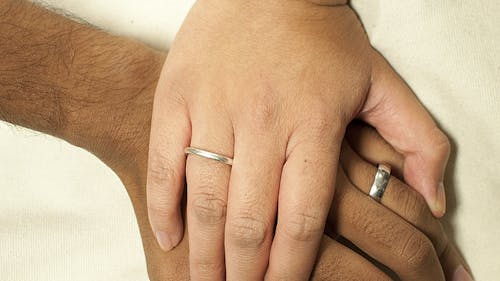Rutgers study shows links between happy marriage, happy life

On a fall afternoon in Ann Arbor, Michigan, in 2007, Deborah Carr and Julie Halpert sat perpendicular to one another on uncomfortable antique chairs in the dining room of Halpert’s home.
These chairs, along with the remaining six, were positioned around a family dining room table, covered with 14 transcribed interviews, scattered Post-it notes, dated laptops and two sizable jars of candy.
Halpert, a freelance journalist and journalism instructor at the University of Michigan, said she enlisted Carr to help her develop her book idea after reading some of Carr’s work.
The assignment was called “Making Up with Mom: Why Mothers and Daughters Disagree About Kids, Careers, and Casseroles (and What to Do About It),” a book on generational differences between daughters and mothers and steps to their resolution.
Halpert said Carr was optimistic, meticulous, smart, supportive and insightful.
“I don’t know how I would have done it by myself,” Halpert said. “It was great having [Carr] be that other person.”
Seven years later, Carr, a professor and chair in the Department of Sociology at Rutgers, helped get Rutgers recognition with her study in this year’s October issue of the Journal of Marriage and Family, titled “Happy Marriage, Happy Life? Marital Quality and Subjective Well-being in Later Life.”
The study involved analyzing more than 300 surveys from couples married for an average span of 39 years with a succinct hypothesis in mind.
Carr, faculty member at the Institute for Health, Health Care Policy and Aging Research, said her goal was to look at the relationship between marital satisfaction and overall happiness. She wanted to take an approach she felt was insufficiently covered.
“Rather than looking at one’s own happiness in the marriage and overall life satisfaction, we looked to see whether our partners happiness with the marriage affects how we feel about our lives,” Carr said.
The results show that the husband’s happiness is dependent on the marital happiness of his wife. For those between 55 and 85, a happy wife is more prone to be kind to, support and be intimate with her husband, Carr said.
A happy marriage is a good predictor of overall happiness because much of a spouse’s life is spent with the significant other, Carr said, especially as the couple ages.
A happy marriage can lead to improved health, happiness and quality of life.
The results of the study were not mirrored for a wife’s overall happiness in relation to her husband’s marital happiness, Carr said.
She believes this is because, while women in the study’s age range are vocal in their feelings toward marriage, men of an older generation are much more reserved.
Another reason is that social constructs of the older generation mold men as those who provide by working and not caregiving, she said. Daughters, sisters or friends tend to take care of the wife instead.
The study also revealed that a husband’s health tends to be directly proportional to a wife’s happiness, Carr said. This goes back to the dynamics of caregiving in older generation marriages.
The results might be different if the same study was administered to those currently in their 20s and 30s when their age reaches the range of this study.
She believes the changing interaction between men and women, as well as gender roles, is a factor. Younger men are more likely to open dialogue about marriage and younger women are working more.
Emily Greenfield, associate professor in the School of Social Work at Rutgers, said Carr’s study exemplifies her strengths.
She said Carr, who was the reason she came to Rutgers, takes a common assumption and uses optimal data and methodologies to test it out.
Greenfield said it is evident that Carr, who has been her colleague since 2007, does what she loves and is both a good scholar and person.
“I think her energy comes from this incredible sense of purpose in the work she does and the integrity she has towards her colleagues, her students and her work as a whole,” Greenfield said.
Carr agreed she loves doing research, which she views as a “puzzle.”
“You start with a question, and you don’t know what you’re going to find,” she said. “The discovery and reasoning and thinking to come up with an answer is a lot of fun.”
Halpert said Carr is incredible and warm.
Carr got a huge kick out of the work she and Halpert did together, Halpert said. Carr explores things people care about and tries to comprehend what makes people happy.
Carr is working on further studies on marriage. She has a study in progress that has found that women in their second marriage are happier than they were in their first. She is also studying how marriage affects frustration, anxiety and sadness.
Carr will be the editor of the Journal of Gerontology: Social Sciences in January 2015. Greenfield said this is a big deal for Rutgers and it solidifies the University’s prominence in the scholarly field of aging.



